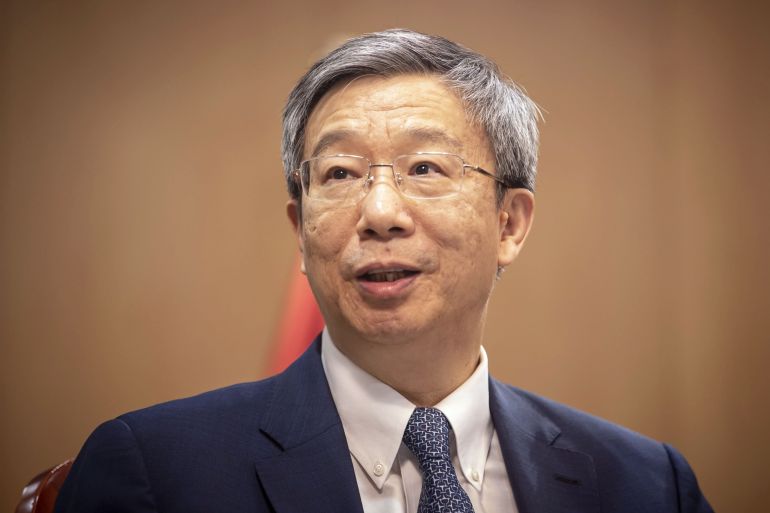China’s central bank ‘ready’ to offer support to small businesses
Governor Yi Gang’s remarks come as the central bank adopts measured easing in the face of rising economic risks.

China’s central bank is ready to provide more support to smaller businesses as economic growth risks mount, Governor Yi Gang said.
Monetary policy is in a “comfortable range” and is helping support the economy, he said on a panel at the Boao Forum for Asia on Friday. “We also stand ready to support small and medium enterprises with more instruments if needed.”
Keep reading
list of 4 items‘Best therapeutic choice’: WHO backs Pfizer’s COVID antiviral
US detention of asylum seekers ‘inhumane and wasteful’: Report
China’s GDP, dubious COVID statistics and East Timor’s election
He cited recent measures by the People’s Bank of China to transfer profits to the central government and support for small and mid-sized businesses. “Accommodative monetary policy is stepping up support for the real economy,” he said.
The PBOC has taken a measured easing approach this year in the face of rising economic risks from the country’s worst Covid outbreak since early 2020. It refrained from cutting policy interest rates last week and gave banks only a modest cash boost, disappointing investors. Economists from UBS Group AG to Nomura Holdings Ltd. have downgraded their growth forecasts for this year to well below the government’s target of about 5.5%.
The Federal Reserve’s rate hikes are adding another complication, restricting the PBOC’s policy room as foreign investors begin to pull out funds from Chinese assets, putting pressure on the yuan.
The benchmark CSI 300 Index erased losses of 1.1% in early trading and edged up by 0.1% by 10:34 a.m. The yield on 10-year government bonds was little changed at 2.825%.
The Boao panel discussion was about global inflation and the interest rate environment, and included speakers like Agustin Carstens, general manager of the Bank for International Settlements, and Tharman Shanmugaratnam, chairman of the Monetary Authority of Singapore.
Yi acknowledged that geopolitical conflicts — referring to the Ukraine war — have pushed up global inflation, and the domestic financial market is not immune to external shocks. The spread of Covid within China has also put more downward pressures on the domestic economy, he said.
Monetary policy is working in tandem with fiscal policy to boost the economy, he said. Referring to the PBOC’s planned transfer of 1 trillion yuan ($155 billion) of profit to the central government, he said the funds will mainly be used for value-added tax refunds and budget transfers to local governments.
“This is a good example of a combination of an accommodative monetary policy and proactive fiscal policy,” he said.
Yi refrained from mentioning more broad easing measures, and instead highlighted the various structural policies it’s introduced to help targeted areas and weak links in the economy.
A relending program that encourages banks to lend to carbon reduction projects has led to 40 million tons of carbon emission reduced annually, he said.
“We are going to have a stable grain production and energy supply this year,” he said. “That will ensure our inflation would be in a reasonable range.”